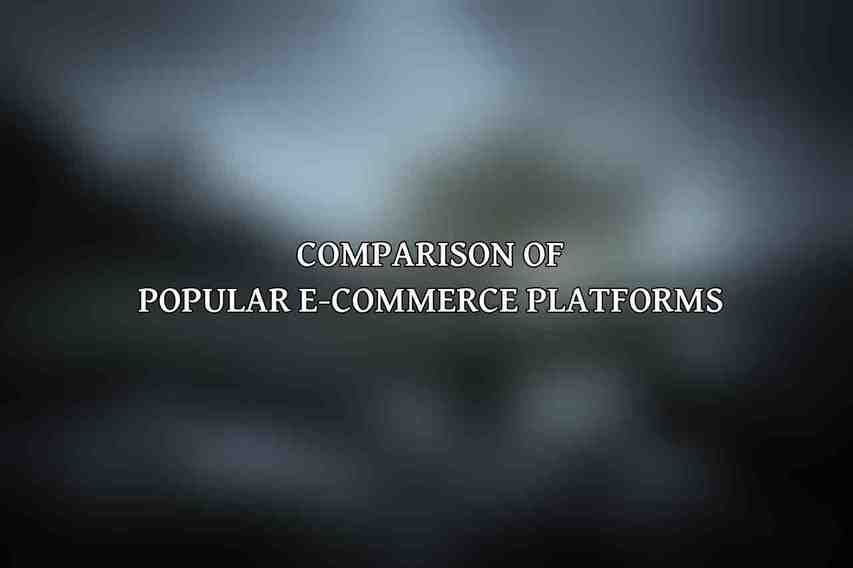Setting up an online store has become essential for businesses looking to reach a wider audience and increase sales. one crucial decision for any e-commerce business is selecting the right platform to host their online store. the choice of an e-commerce platform can significantly impact the success and efficiency of an online business. from managing products to processing orders and payments, a reliable platform plays a crucial role in ensuring a seamless shopping experience for customers.
Choosing the right e-commerce platform is a critical decision that can make or break the success of your online store. An e-commerce platform serves as the foundation for your online business, providing essential tools and features to manage products, process orders, and engage with customers. The platform you select will influence not only the functionality of your online store but also your ability to scale and grow your business effectively.
Key Factors to Consider When Selecting an E-commerce Platform:
When evaluating e-commerce platforms for your online store, several key factors should be taken into consideration to ensure the platform aligns with your business requirements, growth goals, and budget. Read more on Ultimate Checklist for Launching Your E-commerce Website Successfully
A. Business Requirements:
- Sales Volume: Consider the expected sales volume of your online store to ensure the platform can handle the traffic and transactions efficiently.
- Product Catalog Size: Evaluate the size and complexity of your product catalog to choose a platform that can accommodate your inventory needs.
- Target Audience: Understand your target audience’s preferences and shopping behavior to select a platform that offers relevant features and customization options.
- Industry-Specific Needs: Some industries may require specialized features such as subscription services, digital downloads, or complex product variations.
B. Features:
- Product Management and Cataloging: Efficient tools for adding, organizing, and updating products.
- Order Processing and Management: Streamlined order processing, tracking, and customer communication.
- Shipping and Fulfillment: Integration with shipping carriers, real-time shipping rates, and order tracking.
- Payment Processing: Secure payment gateways, multiple payment options, and PCI compliance.
- Marketing and Promotions: Tools for running promotions, discounts, and marketing campaigns.
- Analytics and Reporting: Detailed insights into sales, customer behavior, and performance metrics.
C. Scalability:
- Capacity to Handle Increased Traffic and Sales: Ability to accommodate spikes in traffic during peak seasons or promotions.
- Ability to Expand Features and Functionality: Scalable infrastructure to support the growth and evolving needs of your business.
- Flexibility to Integrate with Other Systems: Seamless integration with third-party apps, extensions, and services to enhance functionality.
D. Costs:
- Platform Subscription Fees: Monthly or annual fees for using the e-commerce platform.
- Transaction Fees: Additional charges per transaction based on the payment processor.
- Setup and Maintenance Costs: Initial setup fees, development costs, and ongoing maintenance expenses.
- Additional Costs for Plugins and Integrations: Expenses for premium themes, plugins, customizations, and third-party integrations.
Comparison of Popular E-commerce Platforms:

To help you make an informed decision, let’s compare some of the top e-commerce platforms based on features, scalability, and costs:
| E-commerce Platform | Features | Scalability | Costs |
|---|---|---|---|
| Shopify | Comprehensive functionality, user-friendly interface, app marketplace | Suitable for small to medium-sized businesses, scalable with paid plans | Basic plan starting at $29/month, transaction fees apply |
| WooCommerce | Open-source platform, highly customizable, extensive plugin ecosystem | Suitable for all business sizes, scalability determined by hosting provider | Free to download, additional costs for hosting, plugins, and themes |
| Magento | Enterprise-level platform, advanced features for large-scale businesses | Highly scalable, supports high-volume traffic and complex integrations | Enterprise edition starting at $24,999/year, additional costs for support and customization |
| BigCommerce | Robust platform with extensive features, headless commerce capabilities | Designed for high-volume stores, scalable with enterprise plans | Standard plan starting at $29.95/month, transaction fees apply |
| Squarespace | User-friendly platform, design-focused templates, e-commerce capabilities | Suitable for small businesses, limited scalability compared to other platforms | Business plan starting at $18/month, transaction fees apply |
A. Shopify:
Shopify is known for its comprehensive functionality, user-friendly interface, and a vast app marketplace offering various tools and integrations. It is ideal for small to medium-sized businesses looking to set up an online store quickly. Shopify offers scalability through its range of paid plans starting at $29 per month, with transaction fees applicable.
B. WooCommerce:
As an open-source platform, WooCommerce provides high flexibility and customizability to users. It is suitable for businesses of all sizes, with scalability dependent on the hosting provider. WooCommerce is free to download, but additional costs may be incurred for hosting, plugins, and themes.
C. Magento:
Magento is an enterprise-level platform designed for large-scale businesses with advanced e-commerce needs. It offers extensive features and scalability to support high-volume traffic and complex integrations. The enterprise edition of Magento starts at $24,999 per year, with additional costs for support and customization.
D. BigCommerce:
BigCommerce stands out for its robust platform with extensive features and capabilities for high-volume stores. It is designed to scale with businesses as they grow, offering enterprise plans for expanding operations. The standard plan of BigCommerce starts at $29.95 per month, with transaction fees applied.
E. Squarespace:
Squarespace is a user-friendly platform known for its design-focused templates and e-commerce capabilities. While suitable for small businesses, Squarespace has limited scalability compared to other platforms. The business plan of Squarespace starts at $18 per month, with transaction fees applicable.
Choosing the Best Platform for Your Business:

When selecting the best e-commerce platform for your business, it is essential to: Check this blog on How to Choose the Perfect Domain Name for Your E-commerce Website
- Evaluate your business requirements against the capabilities of each platform.
- Assess scalability needs to ensure your platform can accommodate future growth.
- Consider the costs associated with platform subscription, transactions, setup, and maintenance.
- Seek guidance from e-commerce consultants or platform experts for informed decision-making.
choosing the right e-commerce platform for your online store is a crucial decision that requires careful consideration of your business needs, growth potential, and budget constraints. By evaluating key factors such as features, scalability, and costs, you can select a platform that aligns with your goals and supports the success of your online business. Remember to explore the options available, compare platforms thoroughly, and make an informed decision that sets the foundation for a thriving online store.
Frequently Asked Questions
What are some key factors to consider when choosing an e-commerce platform?
Some key factors to consider when choosing an e-commerce platform include pricing, ease of use, customization options, scalability, and customer support.
What are some popular e-commerce platforms available in the market today?
Some popular e-commerce platforms available in the market today are Shopify, WooCommerce, BigCommerce, Magento, and Wix.
Which e-commerce platform is best for beginners?
Shopify is often considered the best e-commerce platform for beginners due to its user-friendly interface, helpful resources, and extensive app store.
What are the advantages of using a hosted e-commerce platform?
Hosted e-commerce platforms take care of hosting, security, and maintenance for you, allowing you to focus on running your online store. They also usually come with customer support.
Can I switch e-commerce platforms once I’ve already launched my online store?
Yes, it is possible to switch e-commerce platforms once you’ve already launched your online store, but it can be a complex and time-consuming process, so it’s important to do thorough research before making the switch.

